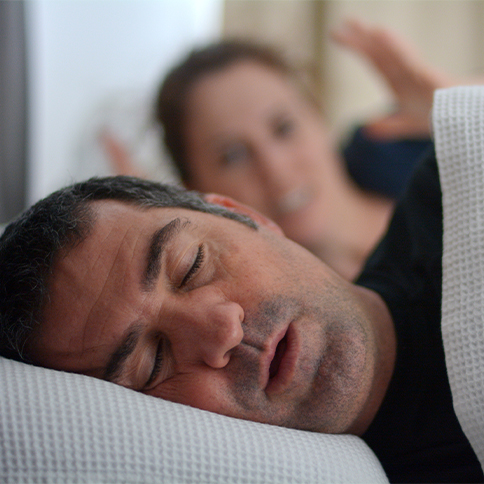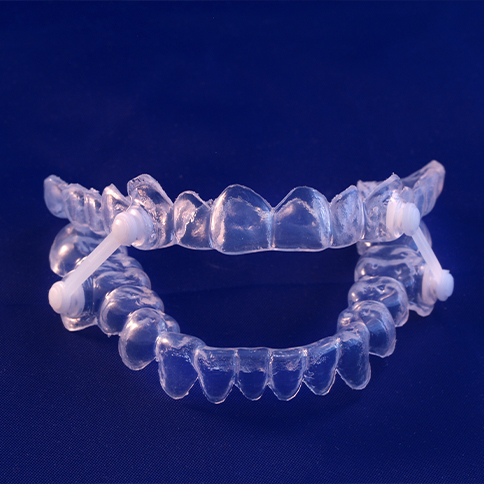Sleep Apnea Treatment Weatherford
Rest Easy Again at Night
Many people consider snoring to be a simple annoyance for anyone who happens to be trying to sleep nearby. The truth is that the noise could very well be the least of your problems. Sometimes, persistent or loud snoring is a side effect of obstructive sleep apnea. If you snore excessively and frequently feel fatigued during the day, you should seek a professional’s help right away. If you’re diagnosed with sleep apnea, you can contact us to schedule an appointment with Dr. Romack, who specializes in helping patients overcome their sleep disorders with sleep apnea treatment in Weatherford. Dr. Romack has completed her Mastery Level I with the American Association of Dental Sleep Medicine. She now has the designation of being a "Qualified Dentist" to properly treat and manage a patient's Obstructive Sleep Apnea problems. According to the AADSM and the American Association of Sleep Medicine (AASM), physicians should always refer their patients to a "Qualified Dentist" for the management of their Sleep Breathing Disorders.
Why Choose Cosmetic & Family Dentistry of Weatherford for Sleep Apnea Treatment?
- We Can Help with At-Home Sleep Testing
- Customized Sleep Appliances Made for Comfort
- Dentist with Mastery Level I with the American Association of Dental Sleep Medicine
What Causes Sleep Apnea?

Various soft tissues inside your mouth and throat can become relaxed at night, causing them to collapse and block the airway. This interrupts your breathing, forcing you to wake up multiple times during the night. People who are overweight, have naturally thick throats, use cigarettes, or are male are more likely to suffer from obstructive sleep apnea. No matter the root cause of the condition, it’s important to have it treated as soon as you can. Untreated sleep apnea can put you at risk for heart disease, stroke, respiratory failure, heart attacks, high blood pressure, and other health complications.
How Is Sleep Apnea Diagnosed?

In addition to loud, frequent snoring, sleep apnea has other symptoms including:
- Excessive sleepiness during the day
- Waking up with a dry mouth
- Morning headaches
- Difficulty concentrating
- Sudden mood changes
- Occasional abrupt awakenings accompanied by gasping or choking
You won’t know for sure that you have sleep apnea until you’ve undergone a sleep test and received a diagnosis for the disorder. When you call Dr. Romack to schedule a sleep apnea consultation, we can help when it comes to undergoing an at-home sleep test. You’ll also want to be sure to describe your symptoms as carefully as possible and make a list of your questions and concerns before you arrive at our office.
How Is Sleep Apnea Treated?

The first thing you need to realize is that there is no one-size-fits-all solution for sleep apnea. Some cases are more severe than others, and the best form of treatment usually depends on what the root cause of the condition is. To make sure that we can offer comprehensive sleep apnea therapy that completely meets our patient’s needs, we work with a team of highly skilled physicians. With their knowledge, we can improve the quality of the personalized care you receive.
In many cases, the best way to treat sleep apnea is with oral appliance therapy. An oral appliance for sleep apnea will hold the jaw in a slightly forward position, which helps keep the upper airway open. This is a comfortable, non-invasive form of treatment that you can easily adapt to, and the oral appliance itself is extremely easy to care for and very convenient when traveling. That said, it may not be appropriate for all forms of sleep apnea, which is why a thorough examination and accurate diagnosis at the beginning of the treatment is so important.
I Need a Checkup & Cleaning I Need Help with a Lip and/or Tongue-Tie I am Worried About Gum Disease I Have a Cavity or Broken Tooth I am Missing One or More Teeth I Want to Enhance My Smile I Want a Straighter Smile I Have Jaw Pain I am Scared of the Dentist I Have a Dental Emergency View Our Services
